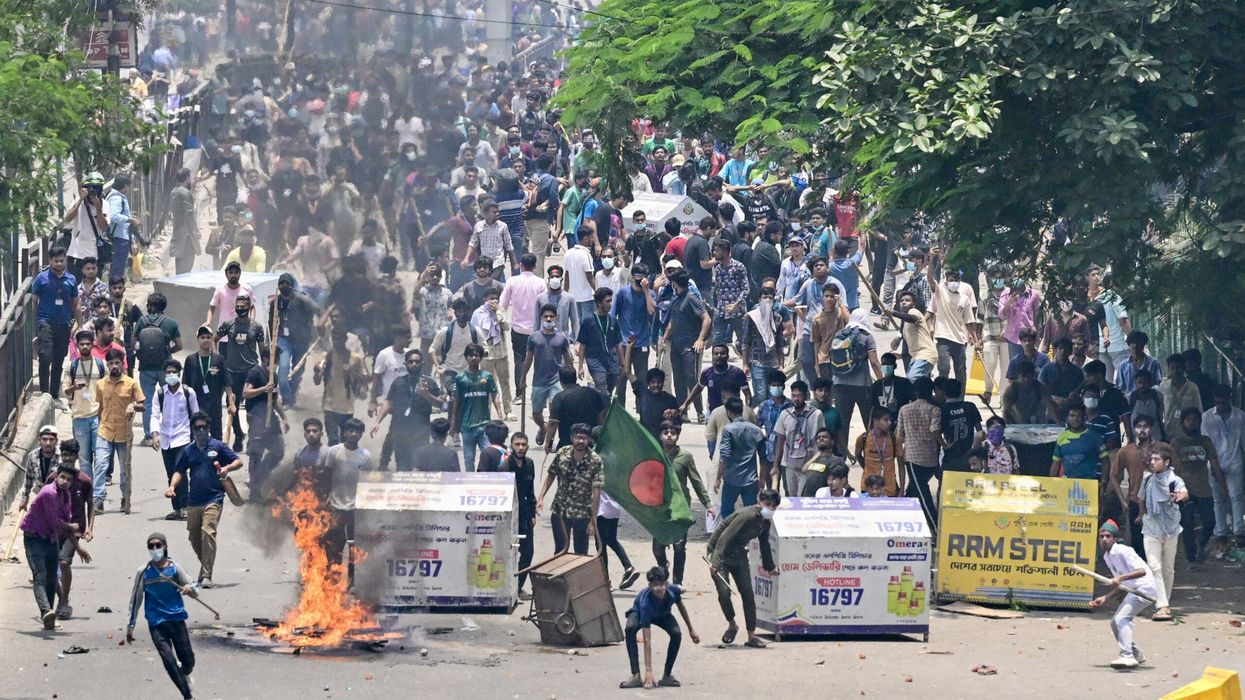Soldiers patrolled Bangladeshi cities on Saturday to address civil unrest from demonstrations. Riot police fired on protesters defying a government curfew.
At least 115 people have been killed this week, according to AFP's count of police and hospital reports. This unrest presents a major challenge to prime minister Sheikh Hasina's government after 15 years in power.
The government imposed a curfew at midnight and asked the military to deploy troops after police failed to control widespread disorder.
"The army has been deployed nationwide to control the law and order situation," armed forces spokesman Shahdat Hossain told AFP.
Streets of Dhaka were nearly empty at daybreak, with troops on foot and in armoured personnel carriers patrolling the city.
Thousands returned to the streets later in the day in Rampura, with police firing live rounds and wounding at least one person.
"Our backs are to the wall," protester Nazrul Islam, 52, told AFP. "There's anarchy going on in the country... They are shooting at people like birds."
Hospitals reported a growing number of gunshot deaths to AFP since Thursday.
"Hundreds of thousands of people" battled police across the capital on Friday, police spokesman Faruk Hossain told AFP.
"At least 150 police officers were admitted to hospital. Another 150 were given first aid treatment," he said, adding that two officers had been beaten to death.
"The protesters torched many police booths... Many government offices were torched and vandalised."
A spokesman for Students Against Discrimination, the main group organising the protests, told AFP that two of its leaders had been arrested since Friday.
A senior official from the opposition Bangladesh Nationalist Party (BNP) was arrested early Saturday, party spokesman Sairul Islam Khan told AFP.
Hasina had planned to leave the country on Sunday for a diplomatic tour but cancelled after a week of escalating violence.
"She has cancelled her Spain and Brazil tours due to the prevailing situation," her press secretary Nayeemul Islam Khan told AFP.
Near-daily marches this month have called for an end to a quota system that reserves more than half of civil service posts for specific groups, including children of veterans from the 1971 liberation war against Pakistan.
Critics say the scheme benefits children of pro-government groups that back Hasina, who has ruled since 2009 and won her fourth consecutive election in January.
Hasina's government is accused by rights groups of misusing state institutions to entrench its power and suppress dissent, including by the extrajudicial killing of opposition activists.
Since the first deaths on Tuesday, protesters have begun demanding Hasina leave office.
"It's not about the rights of the students anymore," business owner Hasibul Sheikh, 24, told AFP at the Rampura protest.
"We are here as the general public now," he added. "Our demand is one point now, and that's the resignation of the government."
Pierre Prakash of Crisis Group told AFP that the lack of competitive elections since Hasina took office had led to public frustration.
"With no real alternative at the ballot box, discontented Bangladeshis have few options besides street protests to make their voices heard," he said.
Hospitals and police reported an additional 10 deaths to AFP on Saturday from clashes the previous day, with 105 other deaths reported since Tuesday.
Police fire caused more than half of the deaths reported this week, based on descriptions given to AFP by hospital staff.
"The rising death toll is a shocking indictment of the absolute intolerance shown by the Bangladeshi authorities to protest and dissent," Babu Ram Pant of Amnesty International said in a statement.
Authorities imposed a nationwide internet shutdown on Thursday, hampering communication in and out of Bangladesh.
Government websites remain offline, and major newspapers including the Dhaka Tribune and Daily Star have been unable to update their social media platforms since Thursday.
Bangladesh Television, the state broadcaster, also remains offline after its Dhaka headquarters was set on fire by protesters.
(With inputs from AFP)





